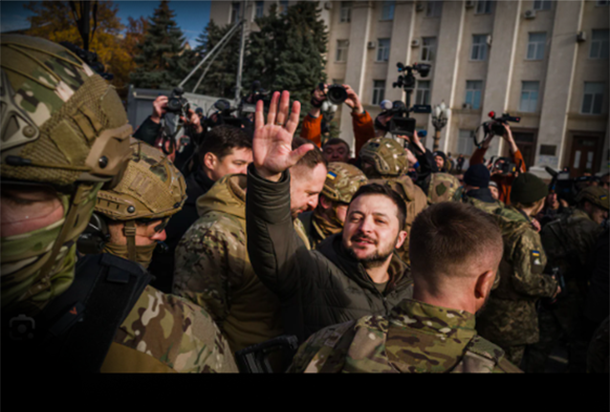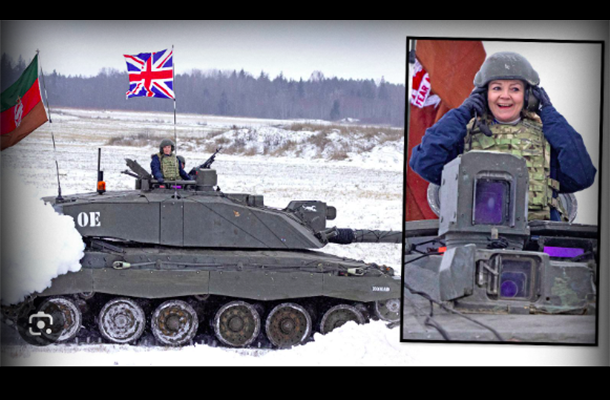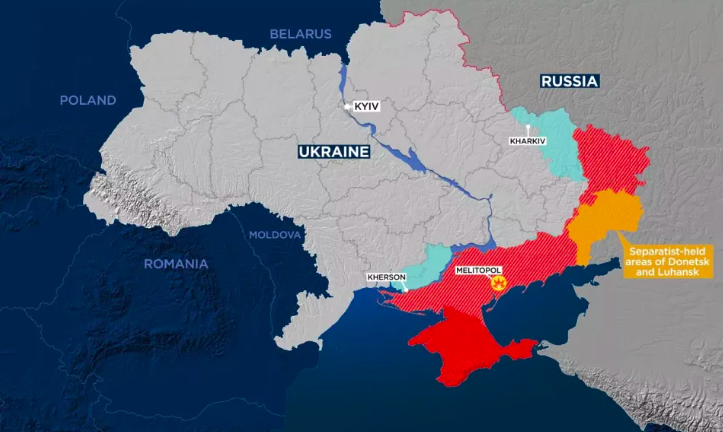The US intelligence community has finally admitted what many in the alternative media have been saying for 6 months now – namely that Ukraine’s much hyped ‘offensive’ has completely failed in its fanciful objective of somehow retaking the coastal city of Melitopol. Moreover, intelligence analysts are now admitting that the war is unwinnable for Ukraine.
Meanwhile, the signs are growing that Russian has already begun to execute its own offensive, which is almost certain to reverse many of the previous perceived gains of Kiev and its western sponsors.
So the writing is already on the wall. The only question now is how and when will military mavens in Washington wash their hands of the awful mess they created?

IMAGE: Despite the near collapse of Ukraine’s military campaign, the Zelensky PR machine still continues to roll on.
Asia Times reports…
According to a report in the Washington Post, Ukraine has sought to cut off Crimea from Russia’s army in southern Ukraine. In parallel to that, Ukraine, with US and British help, has been attacking the Kerch Strait bridge that connects Russia to Crimea. While these attacks have damaged the roadway of the bridge, it is still in use.
In fact, the critical fighting is around the village of Robotyne, which is more than 5o miles (80.5 kilometers) from Melitopol. Here the Ukrainians have committed their best-trained strategic reserve forces, including the Ukrainian 82nd Airborne.
Using Western equipment – British Challenger II tanks, Marder (Schützenpanzer Marder 1) infantry fighting vehicles, US Stryker eight-wheeled tanks, Bradley Infantry fighting vehicles and US-built Mine Resistant Ambush Protected heavily armed transports (MRAPs) – the objective was to break through Russian defenses and race to Melitopol.
While the Ukrainians made some temporary gains, these attacks have been extremely costly in men and material. For the most part, the Russians have rolled back the attacking forces.

IMAGE: Formerly fleeting British PM Liz Truss straddling the much vaunted Challenger tank.
(If you want to amuse yourself, there are countless stories online that say the Challenger tanks will roll right through the Russians. It hasn’t happened.)
Committing reserves to the battle is a desperate move by Ukraine’s army. Should the reserves take heavy losses, as now seems to be the case, they won’t remain effective fighting units. This could doom Ukrainian plans to continue the war.
Ukraine has no manpower to replace its strategic reserves. Most of the pool of educated youths who might be drafted either bribed their way out of recruitment or left the country.
Zelensky this week fired all the military recruiters in the country. He is trying to enlist the army to carry out recruitment drives in the country, using whatever means necessary. There is now talk about grabbing men 40 years old or older for the war machine; many of the soldiers seen in the field appear already over-aged.
Even if Ukraine manages to scrape up men for the army, without training they are more a burden than anything else. Furthermore, scraping the bottom of the barrel brings in unreliable soldiers who may not want to fight.

(Source: Euro News)
That’s a critical problem for Ukrainian officers and non-commissioned officers (NCOs), who not only need to bring recruits up to speed but also must convince them to step into the “meat grinder” and risk their lives. Even now there are examples of units that have refused to participate in engagements they regarded as suicidal.
The Russian strategy has been one of active defense in almost all sectors. The exception is in the Kharkiv oblast, where the Russians are rapidly advancing and will soon attack the town of Kupyansk, a key railway hub that Ukraine needs for running ammunition and supplies to its troops in the northeast. Many observers think Kupyansk will fall in the coming week or so.
Russia says it has not started its own offensive, but is preparing to do so. It has gathered around 100,000 troops in the northeast that could be deployed in a coming offensive. Convoys of equipment have also been seen and filmed, so the buildup process is underway. What is less clear is where Russia is going.
Some think that Russia will aim for Kharkiv, the second-largest city in Ukraine. However, the Russian army has other options: it could try and trap Ukraine’s main army from the north and south, once the Ukrainian offensive peters out. This would endanger the country and could trigger an existential crisis for Kiev.
The US intelligence community’s public report does not really look ahead. But it is likely there also is a much harsher classified assessment. What is the intelligence community actually telling the White House and its National Security Council? And are they capable of paying attention?
Representative Andy Harris (R-MD), co-chair of the Congressional (pro) Ukraine caucus, has reached the conclusion that the Ukraine war is not winnable. Like others, he is talking about the possibility of a stalemate, but it is unlikely Russia will stop until it brings the conflict to a conclusion.
Unlike Ukraine, Russia does not have a manpower shortage and its war industry is now working 24/7 and seems to be producing the equipment needed for the war. This is not the case at all in the US or Europe, which have serious shortages of skilled workers and significant supply chain problems.
Key American defense companies such as Raytheon (RTX Corporation) admit they depend on critical supplies from China. It won’t be long before the Chinese shut that pipeline down. Biden wants another US$20.6 billion for Ukraine, but Congress must agree. It isn’t clear Congress will want to pump big money into a losing proposition.
The US administration wants to stretch out the war until Biden is reelected. It is promoting the idea of a stalemate to try and keep the campfires burning. But the wind is blowing and soon the rain will start. No one in Washington, it seems, has the slightest interest in talking to the Russians and settling the conflict.
Stephen Bryen is a senior fellow at the Center for Security Policy and the Yorktown Institute. This article was originally published on Weapons and Strategy, his Substack. Asia Times is republishing the article with permission.
READ MORE UKRAINE NEWS AT: 21st CENTURY WIRE UKRAINE FILES
ALSO JOIN OUR TELEGRAM CHANNEL
SUPPORT OUR INDEPENDENT MEDIA PLATFORM – BECOME A MEMBER @21WIRE.TV
















